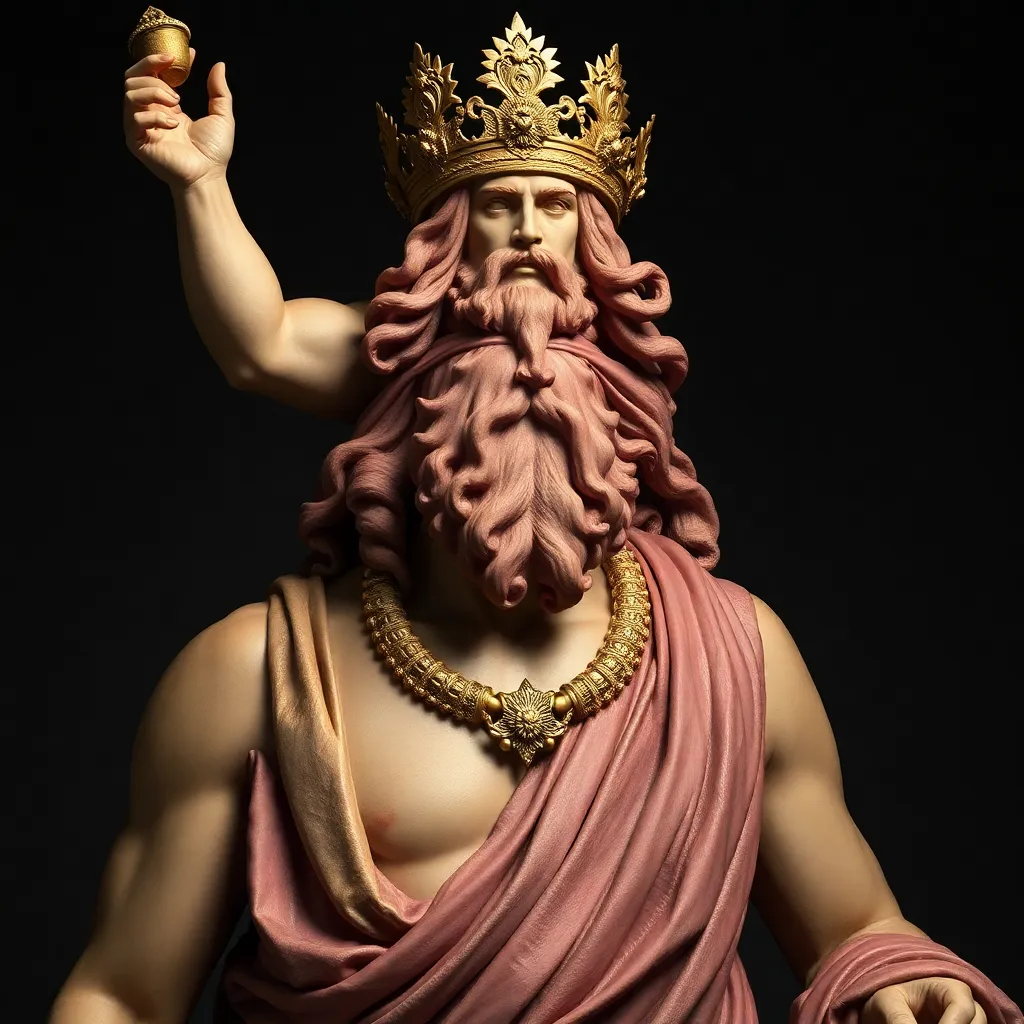Dionysus in Roman Mythology: Bacchus and His Legacy
I. Introduction
Dionysus, the Greek god of wine, fertility, and ecstasy, holds a significant place in Greek mythology. He is celebrated not only for his association with wine but also as a deity of the harvest, theater, and revelry. His Roman counterpart, Bacchus, continues this legacy, embodying similar themes but adapted to Roman culture. Understanding Bacchus gives us insight into how Roman society interpreted and integrated Greek mythology into their own religious and cultural practices.
II. Origins and Mythological Background
The origins of Dionysus are steeped in myth and mystery. He is often depicted as the son of Zeus and Semele, a mortal woman. His birth was extraordinary; after Semele’s demise, Zeus saved the unborn Dionysus by stitching him into his thigh until he was ready to be born.
As Dionysus transitioned to Bacchus in Roman mythology, several characteristics remained intact, yet new elements emerged. The Romans embraced his role as a god of wine and fertility, adapting his myths to fit their own cultural narratives. Key myths associated with both deities include:
- Dionysus’s journey to the underworld to retrieve his mother.
- The tale of the Maenads, his female followers, who would partake in ecstatic rituals.
- His confrontation with Pentheus, showcasing the dangers of denying his divinity.
III. Attributes and Symbolism
Dionysus and Bacchus share many common symbols that represent their divine attributes. These include:
- Grapes and wine: The quintessential symbols of Dionysus and Bacchus, representing abundance and pleasure.
- The thyrsus and ivy: The thyrsus is a staff topped with a pinecone, often associated with fertility, while ivy symbolizes immortality.
Both deities also represent fertility, pleasure, and revelry, emphasizing a connection to nature and the cycles of life. However, there are notable differences in their representations:
- Greek depictions often highlight the ecstatic and frenzied aspects of Dionysus.
- Roman representations of Bacchus tend to focus more on civilized indulgence and the celebration of wine within social contexts.
IV. Cult and Worship Practices
The worship of Dionysus in ancient Greece was marked by the Dionysian Mysteries, secretive rituals celebrating his divine nature and the cycle of life and death. These mysteries involved ecstatic dances, music, and often, the consumption of wine as a means to commune with the divine.
In contrast, Roman adaptations of Bacchic worship included the famous Bacchanalia festivals. These festivals were characterized by:
- Ritualistic dances and processions.
- Libations of wine and offerings to Bacchus.
- Wild celebrations that sometimes led to excess and moral panic among the Roman elite.
The influence of Bacchus on Roman religious practices was profound, as he became integral to the social fabric, representing both the joys and dangers of indulgence.
V. Bacchus in Literature and Art
Bacchus’s presence in Roman literature is notable, with significant mentions by poets such as Ovid and Virgil. Their works often explore themes of transformation, ecstasy, and the dual nature of Bacchus as both a benevolent and a chaotic force.
In addition to literature, Bacchus has been a popular subject in art. Artistic representations include:
- Sculptures depicting Bacchus in various poses, often accompanied by vines and satyrs.
- Paintings from the Renaissance period that portray Bacchus in lavish settings, emphasizing his role as a god of revelry.
The evolution of Bacchus’s image through the ages reflects changing societal values and artistic trends, from the wild, ecstatic representations of the ancient world to the more refined depictions of the Renaissance.
VI. Bacchus and Society
Bacchus played a significant role in Roman social life and culture. He was seen as a symbol of indulgence and excess, often associated with the liberation of the spirit through wine and festivities. His festivals provided opportunities for socialization and community bonding.
The relationship between Bacchus and other Roman deities was also notable. He was often linked with Venus, the goddess of love, highlighting the intertwining of pleasure and ecstasy in Roman thought. This connection underscored the belief in the transformative power of wine and celebration.
VII. Legacy and Influence
The legacy of Bacchus has had a lasting impact on subsequent cultural and artistic movements. The themes of revelry, transformation, and the celebration of life resonate in various forms of art, literature, and performance.
In modern times, Bacchus continues to be interpreted in popular culture, often symbolizing hedonism and the joy of living. His influence can be seen in:
- Film and theater, where characters inspired by Bacchus embody the spirit of revelry.
- Festivals celebrating wine and culture, echoing the Bacchanalia of ancient Rome.
The continuing relevance of Bacchus in contemporary society speaks to the enduring appeal of the themes he represents, such as freedom, enjoyment, and the celebration of life.
VIII. Conclusion
Bacchus’s significance in Roman mythology is profound, as he embodies the complexities of human experience through indulgence, ecstasy, and the celebration of life. His legacy, rooted in the earlier myth of Dionysus, continues to influence modern culture, reminding us of the power and allure of the divine in everyday life.
As we reflect on the enduring legacy of both Dionysus and Bacchus, we are invited to explore the rich tapestry of mythological influences that shape our understanding of pleasure, nature, and the human condition.




